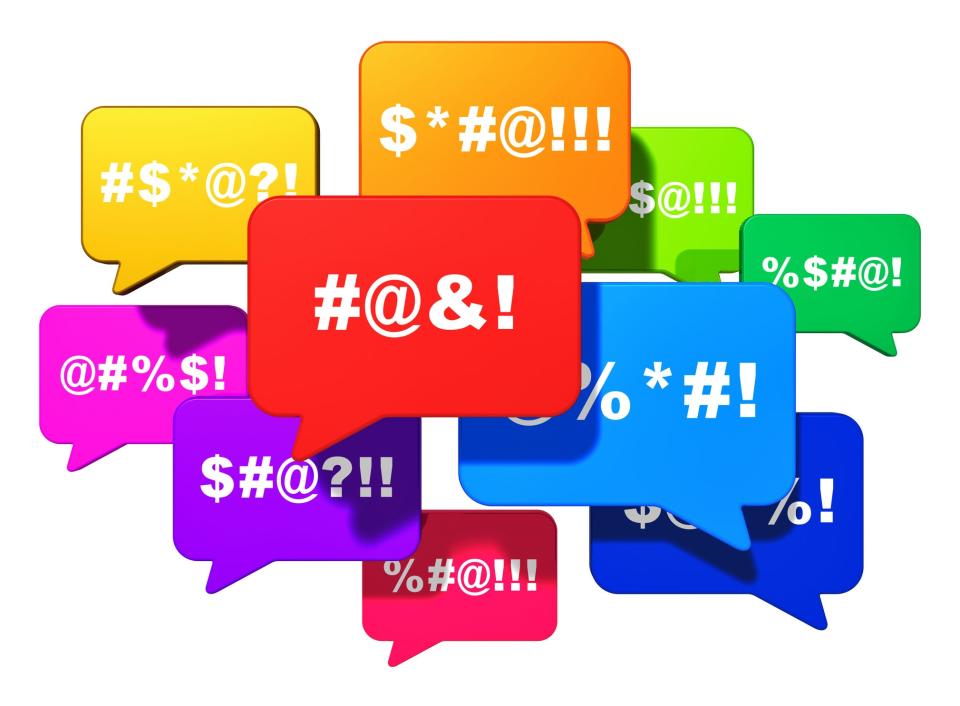Everyone else uses four-letter words. Should newspapers?
"Good authors, too, who once knew better words, now only used four-letter words," Cole Porter observed in 1934.
The four-letter words he had in mind were probably "damn" and "hell."
Words that even your local daily newspaper — generally the most prudish of platforms — now prints without a second thought.
"Newspapers do tend to be the most squeamish of all the media," said Matthew Pressman, associate professor of journalism at Seton Hall University, who examined this issue in a scholarly article called " 'Guttural Phrases' and 'Vulgar Directives': The Evolution of Press Standards on Profanity."

"Guttural Phrases." "Vulgar Directives." Two of the more mealy-mouthed ways newspapers, in the past, have shielded their readers from words like "f**k" and "s**t."
Which is how we do it now. Stars. Blanks. The ever-popular [EXPLETIVE].
These days, the mainstream press has even been known to occasionally drop The F-Bomb, the S-bomb, and other incendiary word-grenades. But very, very rarely. Nothing compared to what we see all the time in bookstores, and on our TV screens.
"The [EXPLETIVE]-It Diet," "What the [EXPLETIVE] Should I Make for Dinner?" "[EXPLETIVE] Feelings, Un-[EXPLETIVE] Your Brain"— not to mention the the best-selling "Go the [EXPLETIVE] to Sleep" — are some publications now on full display at your local Barnes & Noble.

Often, to be sure, The Word is reproduced coyly.
"F*ck" seems to be the preferred choice, though "f**k" is a popular alternative. Other times, all four letters are proudly on parade — right in your face like a custard pie.
Meanwhile, TV ("Schitt's Creek") and movies ("Meet the Fockers") are nearly as explicit. "Chip Happens" is a Ben & Jerry's flavor. "Children's ice cream!" gasped the general (Sterling Hayden) in "Dr. Strangelove." Horrors!
Newspapers, for better or worse, have pulled against the current. We seldom use really bad language. When we do, it is specially sanctioned — from the top of the editorial food chain.
"Each of these situations has to be evaluated on its own merits," said Dan Sforza, executive editor of NorthJersey.com and The Record. "There are serious discussions that occur around this. It can't be for shock value."
All in the family

Matters of Fact | A column about our lives in the age of media
Why? Lots of reasons. But one is a certain concept that is part of our journalistic DNA.
"It's the idea of the family newspaper," said Roy Peter Clark, a journalist, pioneering writing coach, and author (“Tell it Like it Is, a Guide to Clear and Honest Writing”).
"That's the excuse," he said. "We can't put that word in a family newspaper."
It's a classic scene. Sunday afternoon; the living room. Dad, reading about the stock market. Big brother, with the sports section. Mother perusing the women's pages — recipes, fashion, the garden club. Junior with the comics. Something for everyone, and nothing to offend anyone. Above all, no naughty words.

"What would happen if our children picked up the newspaper and saw that word?' " Clark said.
That's how people experienced newspapers, circa 1930. But is it really relevant to 2023?
"I think a lot of this is self-censorship," said Kevin M. Lerner, an associate professor of journalism at Marist College. "I think it's silly in some cases. No 6-year-old is picking up the Times and saying, 'Mommy, what is that word?'"

Such fears were driving editors, and publishers, well into the 21st century. Coupled with the fear of scaring away advertisers — who might balk at seeing their new cars and wondrous shower fittings displayed on the same page as [EXPLETIVE] and [EXPLETIVE].
"The day that Jimmy Carter was quoted as saying 'If Kennedy runs, I'll whip his ass,' I was in the newsroom," Clark said (it was June, 1979 at the St. Petersburg Times, now the Tampa Times).
"The next day I opened the newspaper, and there was the President of the United States quoted as saying, 'If Kennedy runs against me, I'll whip his A-Blank-Blank,' " Clark said. "We newsroom wags looked at each other in disbelief. Gee, what could the missing letters be? I'll whip his arm?"
No real harm done, you might say. But in the case of language, Clark says, it can hurt to err on the side of caution. One example from the 1980s: the AIDS crisis.
"The newspapers were reluctant to describe the sexual practices that were the most dangerous," he said. "I think that cost lives. Rather than saying 'anal sex,' they would say 'exchange of bodily fluids.' I think now when it comes to those kinds of things, newspapers have fewer inhibitions."
The bad old days
Newspapers, in fact, were not always so prim. The so-called "gutter press" of the 19th century was just that. No F or S words. But everything short.
It was partly in response that publisher Adolph Ochs, buying the New York Times in 1896, declared that his paper would "not soil the breakfast cloth." That soon morphed into the Times' famous slogan, "All the News That's Fit to Print."
"It's implying that there is news that is not fit to print," Lerner said. "[Ochs] was explicitly looking at the New York Times as a cleaner, more refined, more grown-up alternative to all this crazy yellow journalism."
Many papers followed the Times' genteel lead — but not, as Pressman points out, all.
In 1944, New York Daily News publisher Joseph Medill Patterson instructed his two managing editors by memo: “Please print the following words in full: Bastard, Son of a Bitch (no hyphens), God damn or Damn.”
In the decades that followed, taboos changed, standards were in flux, and certain words started to be used openly. "I remember the first time, in the late '60s I heard a young woman at a concert use the F word," Clark said. "I was totally shocked."
Today, public conversation at restaurants and supermarkets is often R, if not X, rated. There is no word that kids haven't heard. But the mainstream press has been slow to catch up.
Expletive deleted
A Rubicon was crossed in the early 1970s, with the publication of the Nixon Watergate tape transcripts. The fact that it was the president of the United States using these words — in the context of breaking the law — seemed to justify their use in print, at least according to some editors.
Nearly 30% of newspapers printed all the words in the transcripts without camouflage or alteration, according to a July 22, 1974 story by the Associated Press. "The word s**t," the story noted, "was right out front on page one" of many lead stories, though "not in headlines."
That is still, Pressman says, one of the four contexts in which editors will — sometimes — bend the rules.
In Oct. 8, 2016, for instance, some readers were shocked to see the words "f**k" and "p***y," in full, on the front page of the New York Times. The speaker was — who else? — Donald Trump, discussing the finer points of courtship on an "Access Hollywood" tape, recorded 10 years earlier.
The Record has, in the past, printed in full the term "s**thole countries," which is how then-President Trump referred on Jan. 11, 2018 to the nations of Haiti and El Salvador.
This decision, on the part of some editors, may have come from a desire to show just how aggressive, coarse, and norm-breaking this particular president was. Enough to justify newspapers breaking their own norms.
"My thought is this: if the language in a quote provides insight into a how a person thinks or reacts in a situation, or how a person might approach a subject, the use of the exact language is important," NorthJersey.com's Sforza said. "Otherwise you water down what the person is trying to get across."
Four rules
Bottom line, the president is a public figure. The most important one. So that's one instance, Pressman said, when some editors are inclined to allow a verboten word.

Other instances? To faithfully quote a book, song or movie. To capture the emotions of people under extreme stress, such as cops or accident victims. To accurately relate the speech of marginalized groups, and racial minorities.
Though this last one may be problematic, Pressman said.
"It definitely fits into the long-standing problem of how the white press has covered minority communities," he said.
To show folks from the 'hood Telling It Like It Is, bad words and all — while the guys in the state house have their language discreetly cleaned up — can have an element of condescension, he said.
"It goes back to the early 20th century slumming stories, which would appear in middle-class magazines," Pressman said. "Reporters would go to slum neighborhoods and show life there in a kind of voyeuristic way."
But if newspapers, this late in the day, are the last bastion of restraint in a world of potty-mouths, is it really so bad?

Sometimes — incredible as it may seem in 2023 — a four-letter word isn't necessary.
"I always thought my job was to test the limits of what could be contained in the daily newspapers," Clark said. "But not promiscuously. Early on, an editor said to me, 'There's no knowledge that you can't get into a responsible newspaper, if you do it the right way.' "
Jim Beckerman is a media columnist for the USA TODAY Network's Atlantic Group. For unlimited access to his insightful reports about how you spend your leisure time, please subscribe or activate your digital account today.
Email: beckerman@northjersey.com
Twitter: @jimbeckerman1
This article originally appeared on NorthJersey.com: Should newspapers print four-letter words? Everyone else does

